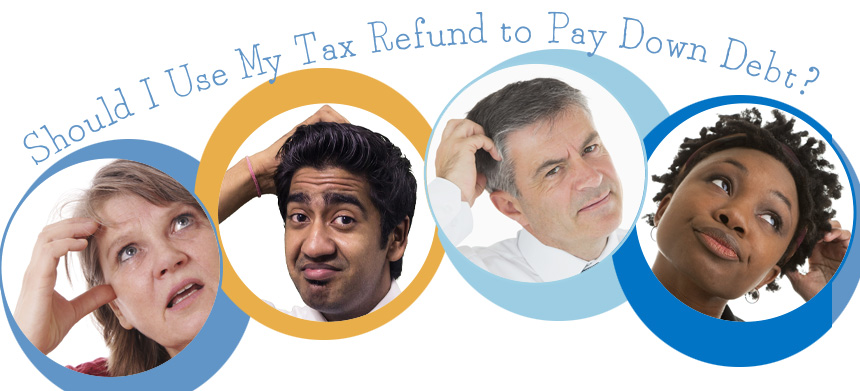Mortgage Blog
Mortgage It Right!
Should I Use My Tax Refund to Pay Down Debt?
February 12, 2019 | Posted by: Kelleway Mortgage Architects

 I am not sure what to do with my tax refund. Should I use it to pay down my debt?
I am not sure what to do with my tax refund. Should I use it to pay down my debt?
 While paying down debt or saving for a rainy day may seem less exciting than making an extravagant purchase, it pays to look at the bigger picture: Household debt is near record levels and interest rates are on their way up.
While paying down debt or saving for a rainy day may seem less exciting than making an extravagant purchase, it pays to look at the bigger picture: Household debt is near record levels and interest rates are on their way up.
But choosing between paying down debt or bolstering a savings account isn’t always an easy decision. Those with refunds need to consider their whole financial picture when weighing the right choice, according to Andy Nasr, director and lead investment strategist at Scotia Wealth Management.
“This isn't just about investing, it's about really developing a plan to preserve and accumulate wealth and that's going to vary from person to person,” he said. “It is going to depend on your objectives and your risk tolerance.”
If you have high-interest debt, such as a balance on a credit card, using one’s tax to reduce or eradicate that debt should be the highest priority.
According to Jamie Golombek, managing director of tax and estate planning at CIBC, there’s nothing that will guarantee a rate of return like paying off a balance on a credit card that is charging 20% interest.
“I wouldn’t do any RRSPs, I wouldn’t do any TFSAs, I would primarily direct that money to paying down that debt,” he said.
The decision is trickier when it comes to debt with less burdensome interest rates. Mortgages, auto loans, and home equity lines of credit may carry much lower interest rates.
The Bank of Canada has increased its key interest rate thrice since last summer—moves which have prompted the major banks to raise their prime rates. The prime rate at Canada’s largest banks now stands at 3.45%, compared with 2.7% at this time last year.
While the timeline is uncertain, economists are forecasting for rates to inch up higher this year, further pushing up the cost of variable-rate mortgages and other lending linked to prime rates.
Nasr said you have to compare the interest rate being paid on the debt with the after-tax rate of return you think you may be able to get to see if you should invest instead.
“I wouldn't consider investing unless I thought my expected return on something, whether it is the cash flow from it or the total return, would be enough to service those debt obligations while I have them,” he said.
Blog Categories
- Main Blog Page
- Alt-A Lending Options (1)
- Announcements (18)
- Builder's Lien Removal (1)
- Community Relations (1)
- COVID-19 and Mortgage Deferral (8)
- Credit & Debt (15)
- Down Payment (2)
- Education and Courses (4)
- Financial Intelligence (17)
- Foreclosures (1)
- Fun Tips (52)
- Home Improvement (2)
- Legal Considerations (2)
- Line of Credit (LOC) (1)
- Mortgage Lenders (2)
- Mortgage Renewals (10)
- Mortgage Trends & Rates (14)
- Mortgage Types (13)
- Moving to Next Home (8)
- My Mortgage Planner App (5)
- Price per Square Foot (1)
- Prize Draw (41)
- Property Types (11)
- Purchase + Improvement (9)
- Qualifying for a Mortgage (14)
- Real Estate Contracts (2)
- Real Estate Market (12)
- Real Estate Taxes (7)
- Recipes & Serena's Tasty Tidbits (5)
- Relocation into Canada (1)
- Selling Your Home (3)
Blog Archives
- July 2022 (1)
- May 2022 (5)
- April 2022 (5)
- March 2022 (5)
- February 2022 (4)
- January 2022 (6)
- December 2021 (5)
- November 2021 (5)
- October 2021 (4)
- September 2021 (4)
- July 2021 (6)
- June 2021 (7)
- May 2021 (4)
- April 2021 (4)
- March 2021 (5)
- February 2021 (4)
- January 2021 (5)
- December 2020 (6)
- November 2020 (4)
- October 2020 (5)
- September 2020 (3)
- August 2020 (2)
- July 2020 (3)
- June 2020 (5)
- May 2020 (3)
- April 2020 (6)
- March 2020 (10)
- February 2020 (5)
- January 2020 (8)
- December 2019 (4)
- November 2019 (6)
- October 2019 (6)
- September 2019 (3)
- August 2019 (4)
- July 2019 (5)
- June 2019 (3)
- May 2019 (5)
- April 2019 (5)
- March 2019 (5)
- February 2019 (8)
- January 2019 (8)
- December 2018 (4)
- November 2018 (7)
- October 2018 (7)
- September 2018 (5)
- August 2018 (5)
- July 2018 (6)
- June 2018 (3)
- May 2018 (4)
- April 2018 (1)
- December 2017 (1)
- February 2017 (2)
- October 2016 (4)
- September 2016 (1)
- August 2016 (6)
- June 2016 (5)
- April 2016 (1)
- March 2016 (4)
- December 2015 (2)
- November 2015 (1)
- June 2015 (5)
- April 2015 (4)
- January 2015 (1)
- December 2014 (1)
- October 2014 (2)
- July 2014 (4)
- April 2014 (1)
- October 2011 (1)


